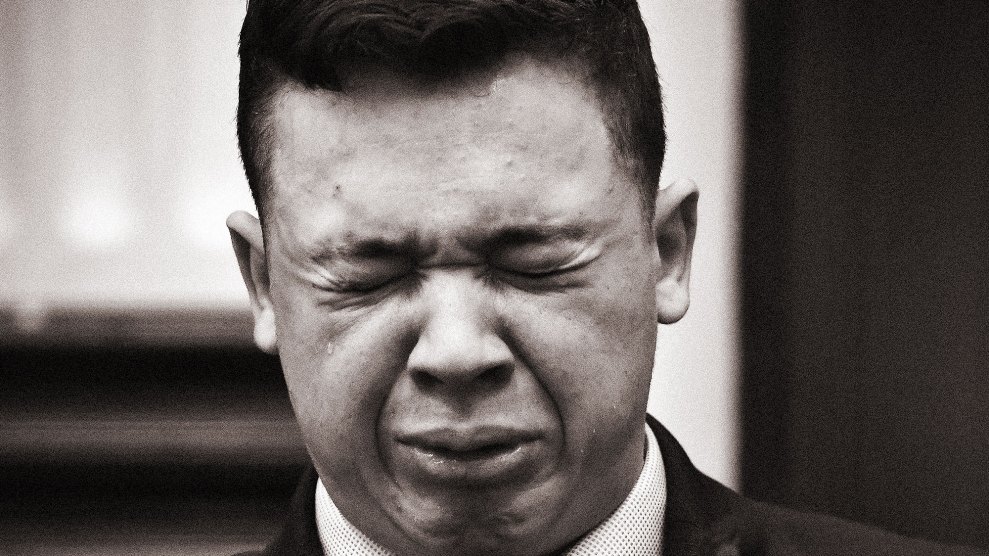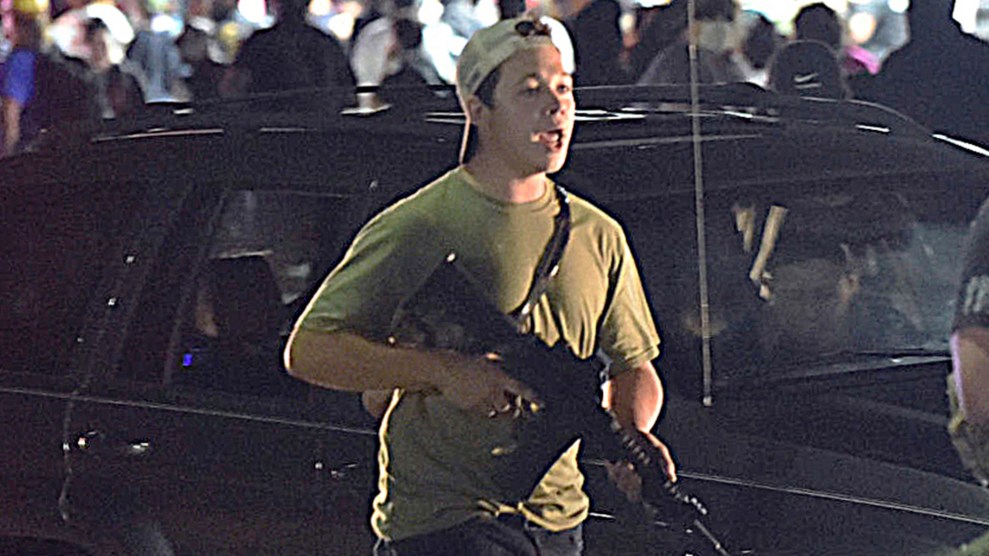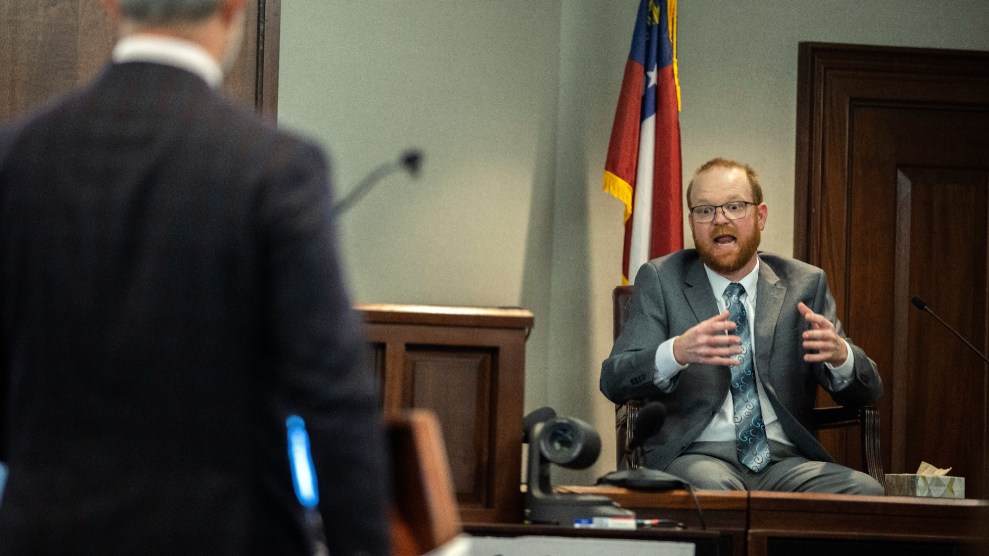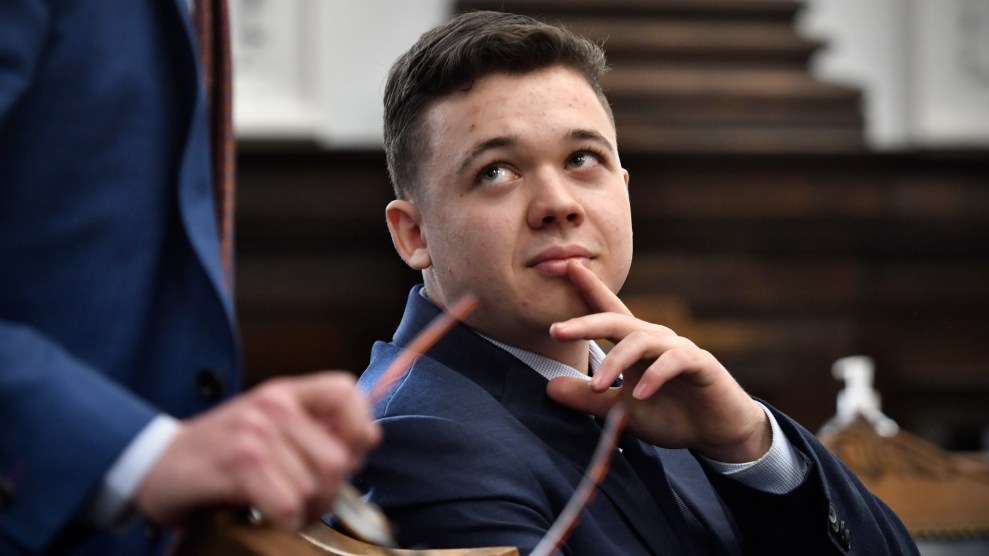
Kyle Rittenhouse broke down describing the events leading up to the shooting of Joseph Rosenbaum as he testified at during his trial in Kenosha, Wisc., Circuit Court. Sean Krajacic-Pool/Getty
On November 10, three days into his trial, Kyle Rittenhouse took the witness stand in his own defense on murder charges stemming from his killing two men and wounding another with an assault weapon during the civil unrest in Kenosha, Wisconsin, in the wake of the 2020 police shooting of Jacob Blake. During his testimony, Rittenhouse was overcome with emotion. Wracked with sobs, he was unable to continue speaking. Whether you believe they were crocodile tears or a legitimate expression of remorse and horror, Rittenhouse’s breakdown marked a turning point in his controversial trial, and probably ensured that the jury would eventually acquit him on all counts—as it did on Friday.
But the tears also highlighted a significant problem with the entire Rittenhouse case, which is that he should never have been on the witness stand, in front of TV cameras, or in an adult court, in the first place. During closing arguments, Rittenhouse’s lawyer underscored that fact when he told the jury, “My client was 17-years-old. His actions should be judged as a 17-year-old.”
It’s not popular to point out that Rittenhouse was a child at the time of the Kenosha shootings, especially in light of the jury’s resounding “not guilty” verdict. But when Rittenhouse took an AR-15 to join armed adult militia members claiming to be protecting property from protesters, he wasn’t old enough to vote. He couldn’t buy booze, join the military, or in some states, even have a full-privilege drivers’ license. He was by every other legal and social measure still a kid, and one whose case should have been handled in the juvenile justice system. There, his catastrophic and deadly fuckup would have been handled away from the cameras and the politicians looking to use him for their own self-promotion, and where the focus would have been not so much on guilt or innocence or self-defense, but on how he got to this terrible place and what should be done to hold him accountable—while still offering a shot at rehabilitation.
However, Wisconsin is one of only three states—along with Georgia and Texas—where the law requires the justice system to treat all 17-year-olds as adults. That’s why Rittenhouse never even had the option of going to juvenile court.
Before I explain the irony of this situation, let’s first be clear about the raw inequalities so painfully exposed by this case: If Kyle Rittenhouse were Black, he probably wouldn’t even have been on trial. He’d be dead. Rather than letting him go home to his mom still toting his gun after he shot three people, the police would most certainly have killed him. And MAGAworld would never have rallied around him as some sort of vigilante hero. They’d be calling for the death penalty, not raising $2 million for his bail.
But Kyle Rittenhouse is white, and when he killed those two men and wounded a third in Kenosha last year, he was 17-years-old. This basic fact about him has been intensely politicized. When the New York Times recently tweeted a story about Rittenhouse that described his childlike affection for cops and firefighters, liberal Twitter responded with a vengeance, canceling their subscriptions and accusing the Times of “lionizing a predator.”
“Did Kyle’s attorneys write this?” Washington Post columnist Karen Attiah tweeted.
Attorney Bakari Sellers complained on CNN during the trial that the judge was too sympathetic: “He’s shielding Kyle Rittenhouse, treating him as if he’s a child.” The New York Times’ columnist Charles Blow wrote that Rittenhouse was being “infantilized,” referring to his embrace by people like J.D. Vance, the Ohio senate candidate and Hillbilly Elegy author who has decried the Rittenhouse trial as “child abuse masquerading as justice.” Vance has referred to Rittenhouse as a “baby boy,” prompting Kali Holloway to write a piece in the Daily Beast slugged, “J.D. Vance’s Empathy for Kyle Rittenhouse Is Revolting.”
“Calling a killer a ‘baby boy’ is a neat trick for gesturing at the ways white lives matter to people like him,” she wrote, “and Black lives do not.” Rep. Hakeem Jeffries, a New York Democrat and advocate for ending mass incarceration even tweeted last week, “Lock up Rittenhouse and throw away the key.”
Lock up Kyle Rittenhouse and throw away the key.
— Hakeem Jeffries (@hakeemjeffries) November 10, 2021
What’s been lost in all the punditry and hysteria around the Rittenhouse case is the fact that reformers have been trying for decades to keep minors out of the adult criminal justice system. That’s in part because laws allowing children to be tried as adults are spectacularly racist, both in intent and in impact.
“While there has been a lot of outrage about the case and the judge’s treatment of Rittenhouse, I think the truth of the matter is we’d have a very different system if every judge saw their own child in every kid that comes through their courtroom,” says Jody Kent Lavy, co-director of the Campaign for Fair Sentencing in Youth. “But that isn’t how the system operates. Kids of color are disproportionately tried as adults and that’s because of this long history of racism in this country. Judges and juries often see children of color as more dangerous, and the outcomes reflect that.”
Indeed, Wisconsin’s law mandating adult prosecutions of juveniles is a legacy of the 1990s panic over “superpredators”—the allegedly cold-blooded, conscienceless, and often Black kids who would supposedly kill for sport, without remorse, who criminologists warned were about to overwhelm the country. The superpredator was obviously a myth, but the panic it inspired spurred many states to implement draconian laws to allow more children to be prosecuted as adults. Wisconsin’s especially harsh law, passed in 1996, allows kids as young as 10 to be tried as adults for murder. The result has been that children of color have been disproportionately funneled into an adult penal system, in which Black people make up more than 40 percent of the population despite representing just 7 percent of Wisconsin residents.
Over the past decade, a “raise the age” movement has pushed back on such harsh laws to move kids back into the juvenile system where they belong. The movement has had some success, based on lots of science indicating that the human brain doesn’t reach full maturity until about age 25. That science has been the basis for a string of Supreme Court decisions starting in 2005 that have abolished the death penalty for juveniles and ended the imposition of life without parole sentences on kids who were under 18 at the time of their crimes. Given all we know today about the teenage brain, no child, not even Kyle Rittenhouse, should be tried as an adult.
“There is a growing recognition that a kid is a kid is a kid,” says Marsha Levick, deputy director and chief counsel of the Juvenile Law Center. “And if they are to be prosecuted it should be as a juvenile and not in the adult justice system. The leading reform voices are in consensus about this. It’s not an outlier view today. And the science takes us there.”
Eleven states have raised the age of criminal responsibility since 2007, but Wisconsin is not one of them—and not for lack of trying by Democrats. Rittenhouse’s case is not likely to help the cause. That’s the problem with criminal justice reform: there are no good cases, and there’s always a new terrible one on the horizon that opponents can seize on to block meaningful change.
In Roper v. Simmons, the 2005 Supreme Court case that abolished the death penalty for minors, the convicted killer, 17-year-old Christopher Simmons, even seemed to fit the profile of the 1990s superpredator. With two high school friends, he planned to murder someone just “because they could get away with it” as minors. The high school junior broke into a woman’s house, wrapped her face in duct tape, and bound her hands and feet with electrical wire before throwing her off a railway bridge into Missouri’s Meramec River.
Despite the brutality of the premeditated crime, the Supreme Court ruled that executing juveniles violated the Eighth Amendment’s prohibition on cruel and unusual punishment. Quoting from scientific journals, Justice Anthony Kennedy bolstered his majority opinion with research on teenagers. “’[A]dolescents are overrepresented statistically in virtually every category of reckless behavior,’” he wrote, pointing out that “In recognition of the comparative immaturity and irresponsibility of juveniles, almost every State prohibits those under 18 years of age from voting, serving on juries, or marrying without parental consent.” And unlike adults, he observed, “juveniles are more vulnerable or susceptible to negative influences and outside pressures, including peer pressure.”
All of those observations apply to Rittenhouse, who wanted an assault weapon because it “looked cool.” He was bullied so much in high school that his mother tried to get a restraining order against his tormenters, and he was clearly desperate for some affirmation. He idolized the police and was invited by adults to take an assault weapon to a civil disturbance. Later, after he’d killed two people, his mother took him to the police station to turn himself in, where, the New Yorker reports, Rittenhouse spent his time crying and vomiting. Raised by a single mother who alleged abuse from his alcoholic father when he was four, the Rittenhouse family had suffered through evictions and bankruptcy. They’d twice lived in shelters, and Kyle had dropped out of high school.
None of this excuses what Rittenhouse did, but these are the sorts of mitigating factors that the juvenile system would in theory consider in trying to figure out what should be done with an adolescent who shot three people, killing two of them. Clearly, in the juvenile system, children of color often don’t get treated with that sort of understanding either, but they never do in the adult system.
Writing in the Atlantic last year, Elder G. Yusef Qualls, a Black retired pastor and criminal-justice advocate whose teenaged son was sentenced to life without parole, suggested that Rittenhouse deserved mercy for the same reasons his own son did—because they were both children who’d made deadly mistakes. Rittenhouse, he wrote, “must be held accountable, but the courts need to recognize that he is, in fact, a child…Years from now, he may become someone unrecognizable from his 17-year-old self. And like every other person sentenced as a child, he should be given the chance to redeem himself.”
A juvenile trial might also have spared the country so much of the polarizing and divisive rhetoric around Rittenhouse’s case while leaving him less vulnerable to being exploited by adults who definitely knew better. After Rittenhouse was arrested, some of the most media-hungry lawyers in the Trump universe swooped in to represent him, despite their lack of experience in criminal cases. And then came the massive fundraising campaigns to “free Kyle” and pay his legal fees—that is, their own inflated bills—and the $2 million bail set in his case.
Tried as an adult, Rittenhouse faced the prospect of up to six decades in prison, with none of the rehabilitation services guaranteed to kids in the juvenile system. (Ironically, while one of the counts he was charged with carried the possibility of life without parole, a 2012 Supreme Court ruling outlawed such sentences for juveniles.) In Kenosha’s juvenile court, there is no bail, often there is no jury, and there are definitely no cameras. The longest sentence in juvenile court would extend only until Rittenhouse turned 21. The lower stakes and the simpler trial would largely have negated the need for a phalanx of expensive, high-powered lawyers or legal defense funds.
Plus, juvenile proceedings are strictly confidential. Only the defendant’s parents and some court staff are allowed to watch. A judge could even have appointed Rittenhouse a guardian ad litem, to make decisions in his best interest. This neutral party might have been able to help shield him from the opportunistic and irresponsible adults who thought it was a good idea to take him out for a beer with the Proud Boys wearing a “Free as Fuck” t-shirt while he was awaiting trial. Indeed, he might have awaited trial in detention in the juvenile system, rather than free on bail paid by adoring fans.
@CNN this is Kyle Rittenhouse, out on bail at a bar drinking beer. Doesn’t this violate some laws? 🤔 pic.twitter.com/dd4I6OyO0O
— Ashley (@smashhleeyy) January 8, 2021
A confidential juvenile proceeding and a three-year sentence would probably not have satisfied any liberal blood lust. But as it turned out, trying Rittenhouse as an adult ensured that he won’t do any time at all. His emergence from the trial as a hero can’t offer much solace to his victims or their families, much less to the community at large, where anger over his acquittal threatens to spark more violence. It also precludes the possibility that someday, Rittenhouse might take responsibility, feel remorse, and try to atone for his sins.
Why would Rittenhouse do any of those things now that he’s become a conservative icon, basking in the warm glow from gun nuts and members of Congress alike? Rep. Matt Gaetz (R-FL) has even said he’d offer Rittenhouse a job. Now that he’s been acquitted, he’ll be guaranteed a spot on the conservative and Second Amendment speaking circuit for the foreseeable future, where he’ll be cheered for killing people. By prosecuting a teenager as an adult and treating Rittenhouse like a monster, the justice system may just have created one.














